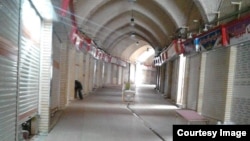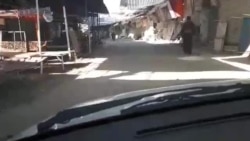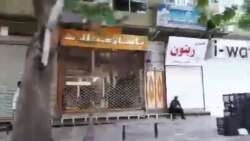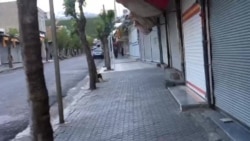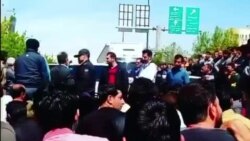Iranian Kurds say police have stepped up their intimidation of striking shop workers engaging in a sixth day of protests against government restrictions on border trade in Iran’s impoverished northwest.
Kurdish residents of the region who contacted VOA Persian via social media said Iranian police briefly detained dozens of people Friday, ordering them to sign pledges to end the strikes before releasing them. They said police warned other shopkeepers to re-open their stores Saturday or face arrest.
WATCH: Shops Closed as Part of Strike in Javanrud, Iran
Iranian Kurds began shutting their stores last Sunday in the towns of Baneh and Javanrud to protest a months-long government blockage of border footpaths they rely on for trade with northern Iraq’s Kurdistan region. Residents have complained that the blockades caused further hardship in Iran’s minority Kurdish areas that already suffer from a lack of manufacturing and job opportunities.
Iran’s official IRNA news agency quoted Baneh’s deputy governor Nejad Shahidi on April 15 as saying that Iran acted at Iraq’s request to “bring order to border trade and preserve security in border areas.”
WATCH: Shops in Marivan, Iran, are Closed in a Workers Protest
In recent days, the strikes have spread to six other towns: Mahabad, Marivan, Piranshahr, Saqqez, Sardasht and Sarpol Zahab. Residents told VOA Persian that they planned a seventh day of strikes Saturday in defiance of police warnings.
WATCH: Shops Closed in Piranshahr, Iran, in Protest of Border Restrictions
Iranian Kurds in a far northern town near the Turkish border said the strikes happening to the south inspired them to stage their own protest Friday. A video sent to VOA Persian showed dozens of protesters sitting and standing next to a street in Bazargan.
WATCH: Protesters Rally Near Turkish Border in Bazargan, Iran
Residents said the protesters were angered by a recent increase in departure taxes on Iranians for exiting the country for purposes other than pilgrimage. They said the move has made travel to Turkey unaffordable for Iranian Kurds whose income relies on visiting the country to buy relatively cheap items for sale at home. Iran’s parliament approved the departure tax increases in February.
In another development, an Iranian opposition news site said support for the striking shop workers is growing in Iran’s Kurdish communities. The Kaleme website affiliated with detained opposition leader Mir Hossein Mousavi reported Friday that two groups issued statements supporting the protest movement: the Center for Cooperation of Iranian Kurdish Political Parties, and a student group at Marivan’s Payam-e Nur University.
This report was produced in collaboration with VOA’s Persian Service.




